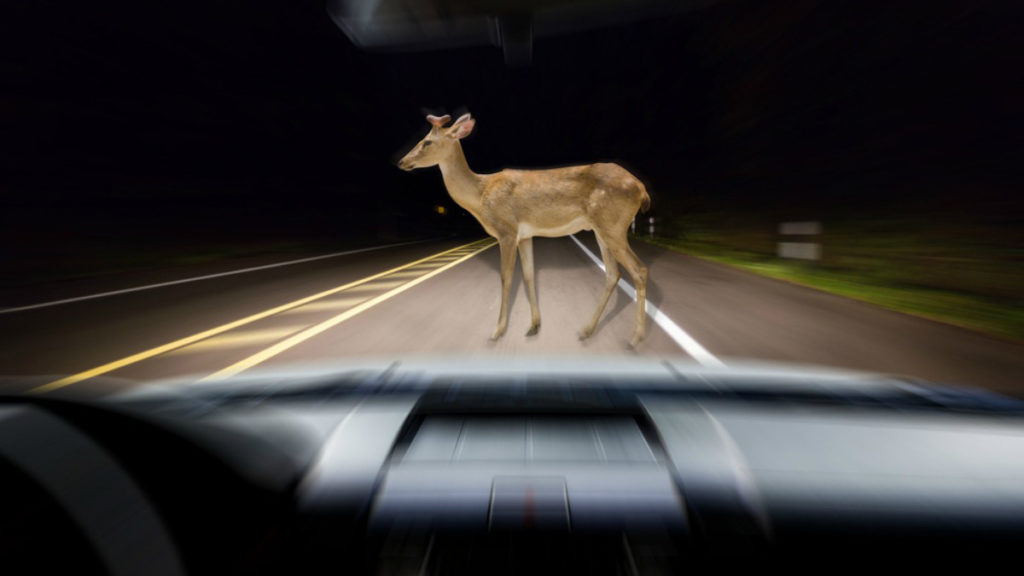Last Updated on October 7, 2024 by Katrina

It’s a nightmare scenario made even worse when you’re traveling: You hit a deer while driving a rental car.
There are about 2.1 million car accidents involving deer annually, according to the National Deer Association —most occurring in fall and winter. Each accident can incur an average of $5,600 in insurance claims, according to AAA, which adds up to nearly $12 billion per year.
The peak time for deer-vehicle collisions is from October through December, during breeding times when the animals tend to be far less cautious. Most incidents occur in the two hours before sunrise and after sunset each day.
How to Avoid Deer on the Road
The National Deer Association offers tips to reduce your risk of hitting a deer on the road, including:
- Be especially vigilant when driving at dawn and dusk.
- Slow down when the road travels through wooded areas.
- If you see one deer, assume a second and third deer are following behind.
- Use your high beams at night when there is no oncoming traffic.
- Use your horn to help deer discern where the danger is coming from, since the animals can become confused and disoriented by bright headlights.
- If a deer jumps in front of your car, do not swerve.
4 Steps to Take If You Hit a Deer in Your Rental Car
What should you do if you hit a deer while driving a rental?
Step 1: Evaluate the Damage & Call for Help if Needed
First, do all the things you would in any accident. Pull over to the side of the road, turn on your hazard lights, and make sure everyone is okay. If anyone needs help, call 911—and also call the police if the deer in the road could still pose a safety hazard for other drivers. The police can help bring in the right authorities if the deer can be saved—and you should keep a safe distance from the injured deer, since it could kick and injure you.
Ask AutoSlash for a Quote on a Cheap Car Rental
Next, check the rental car for any damages, including body damage, broken lights or loose parts. Also, take some photos of the road and even the deer, since it can be useful to give context when filing a claim, and get contact information from any witnesses.
Step 2: Get Roadside Assistance
If you’re not confident that the car is safe to drive, get roadside assistance. If you didn’t purchase the car rental company’s roadside assistance service, you may have access to this service through a membership such as AAA or AARP, or as a benefit of the credit card that you used to rent the car.
Other options include pay-per-use platforms like Urgent.ly or the Honk app, which are affordable and fast.
Buy Collision Insurance For Less Than What You’ll Pay at the Rental Counter
As a last resort, you can try calling the rental car company’s roadside assistance number anyway. Even if you didn’t buy the roadside assistance plan, they can send help for a standalone fee.
Step 3: File a Police Report
Do you need to file a police report? The laws vary from state to state. In Pennsylvania—one of the top states for deer-related accidents—you have to file a police report if one car can’t drive away from the scene. In Montana, another state prone to deer accidents, you only have to file a report if there is more than $1,000 in damages (and you can often file the report online). Either way, it’s always smart to take photos at the scene and go ahead and file a police report since both of these actions will help back up your insurance claim.
Step 4: File an Insurance Claim for Damages
If you bought the rental car company’s collision damage waiver (CDW), you’re covered for the costs to repair or replace the vehicle—unless the accident was due to reckless driving or another breach of your rental agreement. Remember, though, that the rental company’s damage waivers don’t cover liability for medical expenses or property for you or other people involved in the accident. You’ll have to rely on your personal insurance or the rental company’s supplemental liability coverage for that.
Let AutoSlash Track Your Car Rental for Price Drops
Most personal auto insurance policies cover rentals, but double check your coverage limit and deductible. For most car insurance policies, hitting a deer would be covered under a comprehensive package, and if your policy extends to car rentals, you are covered for both collision and liability up to the limits of your coverage.
Related:



